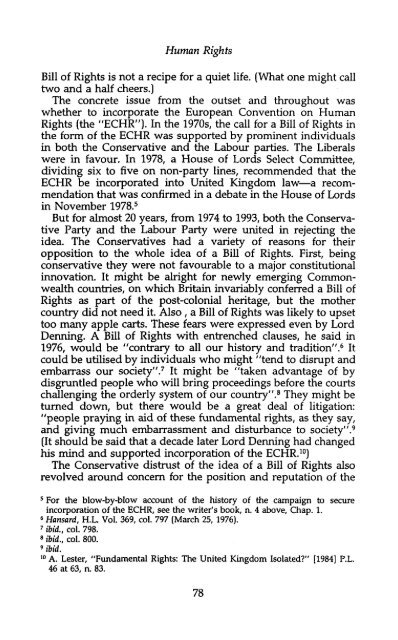HAMLYN - College of Social Sciences and International Studies ...
HAMLYN - College of Social Sciences and International Studies ...
HAMLYN - College of Social Sciences and International Studies ...
Create successful ePaper yourself
Turn your PDF publications into a flip-book with our unique Google optimized e-Paper software.
Human Rights<br />
Bill <strong>of</strong> Rights is not a recipe for a quiet life. (What one might call<br />
two <strong>and</strong> a half cheers.)<br />
The concrete issue from the outset <strong>and</strong> throughout was<br />
whether to incorporate the European Convention on Human<br />
Rights (the "ECHR"). In the 1970s, the call for a Bill <strong>of</strong> Rights in<br />
the form <strong>of</strong> the ECHR was supported by prominent individuals<br />
in both the Conservative <strong>and</strong> the Labour parties. The Liberals<br />
were in favour. In 1978, a House <strong>of</strong> Lords Select Committee,<br />
dividing six to five on non-party lines, recommended that the<br />
ECHR be incorporated into United Kingdom law—a recommendation<br />
that was confirmed in a debate in the House <strong>of</strong> Lords<br />
in November 1978. 5<br />
But for almost 20 years, from 1974 to 1993, both the Conservative<br />
Party <strong>and</strong> the Labour Party were united in rejecting the<br />
idea. The Conservatives had a variety <strong>of</strong> reasons for their<br />
opposition to the whole idea <strong>of</strong> a Bill <strong>of</strong> Rights. First, being<br />
conservative they were not favourable to a major constitutional<br />
innovation. It might be alright for newly emerging Commonwealth<br />
countries, on which Britain invariably conferred a Bill <strong>of</strong><br />
Rights as part <strong>of</strong> the post-colonial heritage, but the mother<br />
country did not need it. Also , a Bill <strong>of</strong> Rights was likely to upset<br />
too many apple carts. These fears were expressed even by Lord<br />
Denning. A Bill <strong>of</strong> Rights with entrenched clauses, he said in<br />
1976, would be "contrary to all our history <strong>and</strong> tradition". 6 It<br />
could be utilised by individuals who might "tend to disrupt <strong>and</strong><br />
embarrass our society". 7 It might be "taken advantage <strong>of</strong> by<br />
disgruntled people who will bring proceedings before the courts<br />
challenging the orderly system <strong>of</strong> our country". 8 They might be<br />
turned down, but there would be a great deal <strong>of</strong> litigation:<br />
"people praying in aid <strong>of</strong> these fundamental rights, as they say,<br />
<strong>and</strong> giving much embarrassment <strong>and</strong> disturbance to society". 9<br />
(It should be said that a decade later Lord Denning had changed<br />
his mind <strong>and</strong> supported incorporation <strong>of</strong> the ECHR. 10 )<br />
The Conservative distrust <strong>of</strong> the idea <strong>of</strong> a Bill <strong>of</strong> Rights also<br />
revolved around concern for the position <strong>and</strong> reputation <strong>of</strong> the<br />
s For the blow-by-blow account <strong>of</strong> the history <strong>of</strong> the campaign to secure<br />
incorporation <strong>of</strong> the ECHR, see the writer's book, n. 4 above, Chap. 1.<br />
6 Hansard, H.L. Vol. 369, col. 797 (March 25, 1976).<br />
7 ibid., col. 798.<br />
8 ibid., col. 800.<br />
9 ibid.<br />
10 A. Lester, "Fundamental Rights: The United Kingdom Isolated?" [1984] P.L.<br />
46 at 63, n. 83.<br />
78

















